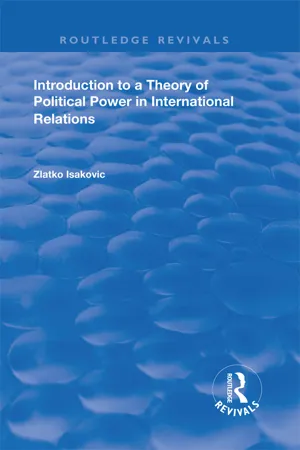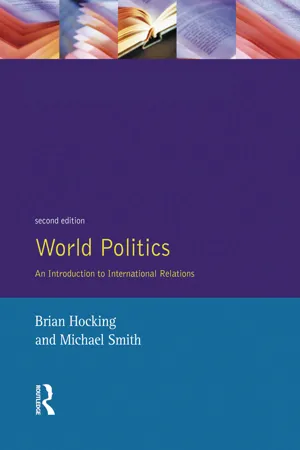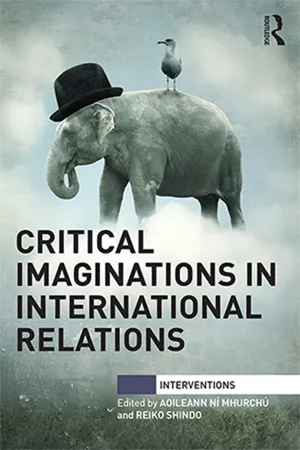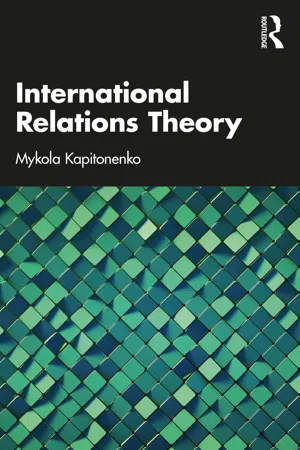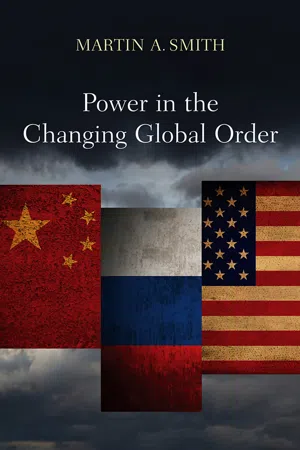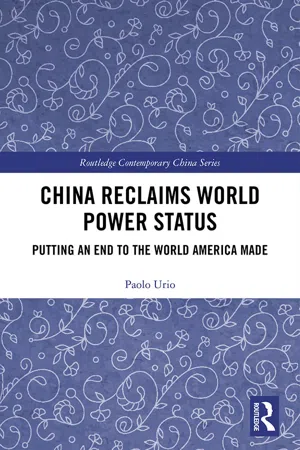Politics & International Relations
Power in Politics
Power in politics refers to the ability to influence or control the behavior of others, often through the use of authority, coercion, or persuasion. It can be exercised by individuals, groups, or institutions and is a central concept in understanding how decisions are made, resources are allocated, and conflicts are resolved within political systems.
Written by Perlego with AI-assistance
Related key terms
8 Key excerpts on "Power in Politics"
- Zlatko Isakovic(Author)
- 2019(Publication Date)
- Routledge(Publisher)
Deutsch departs from the fact that all states (not only superpowers) have some power enabling them at least partly independent social development, but lesser territorial scope. Superpowers, on the one hand,Aron defined the phenomenon of power as the 'ability possessed by one man or group to establish relations conforming to his or its wishes with other people or groups' (1972: 176).wield influence (or coercion if influence is ineffective) and, on the other hand, they are much more dependent on the external environment than some small states... Interdependence, however, obviously creates a sort of hierarchy of states in view of the scope, range and domain of each of them, which in political relations transforms into political influence that may be voluntarily accepted, but may also lead to establishing hegemony or another form of domination (Stojanovic, 1982: 76-8).Kissinger distinguishes between offensive power (the ability to impose will on others), defensive power (the state's ability to avoid or defend itself from others intending to impose their will on it) and deterrent power (ability to reply to threat by great risk, noting that it will be responded to reciprocally or by even greater force). He also distinguishes between power wielding influence by force and power affecting international relations without applying force (1965: 5).Russet and Starr are of the opinion that power in international relations simply represents 'the ability to achieve what one wants' (1985: 130).Holsti maintains that A can be said to possess more power than B in regard to a specific thing if A can influence B to do something, but B cannot succeed in making A do a similar thing. On the other hand, if A tries to influence B's behaviour, it is almost impossible to find a situation in which B has no opportunity to affect A's behaviour (1972: 156).Dimitrijevic and Stojanovic are of the opinion that power can be defined as the 'degree of ability to compel or force other actors to behave as the power possessor wants them to' (1988: 384), i.e. as 'an accumulated ability to produce changes' (Stojanovic, 1981: 81). From the valueless cybernetic point of view, power is the 'degree of probability that the outcome will be the one desired by the actor' (Dimitrijevic, 1978: 154).- eBook - ePub
World Politics
An Introduction to International Relations
- Brian Hocking, Michael Smith(Authors)
- 2014(Publication Date)
- Routledge(Publisher)
12 .Chapter 11 takes up the question of power, and particularly the links between the possession of power, its use and its effects.Chapter 12 moves on to explore international interactions – defined as ‘politically relevant processes of communication and exchange between actors in the world arena’ – and to identify some of the ways in which these interactions can be evaluated.The final chapter in the section, Chapter 12 , sets out to bring together the main themes of the section by presenting a case study of US-Soviet relations during the 1970s and 1980s and assessing the changes of the 1990s.Issues and debates
Policy and politics
- Who makes policy in the world arena, what about and with what results? How has the changing nature of the world arena affected the formulation and practice of foreign policy by states?
- Who gets what, when and how in the world arena? What is the nature of political relationships and political activity on the world stage? Who or what has authority and legitimacy in world politics and how are these achieved?
Power and international relations
- Are international relations best described as ‘power politics’, shaped by and reflective of the competition between states? What resources are available to actors in the world arena, and how are these to be assessed?
- What strategies and techniques will best mobilise the resources of states and other actors in specific situations? How are resources translated into influence and effects and how can the effectiveness of particular actions be evaluated?
- eBook - ePub
- Aoileann Ní Mhurchú, Reiko Shindo(Authors)
- 2016(Publication Date)
- Routledge(Publisher)
11 Power Rita Abrahamsen DOI: 10.4324/9781315742168-11The concept of power is at the heart of International Relations. Since its inception as an academic discipline, power and the varying capacities and abilities of states to wield it have defined and animated debates, as evidenced by terms like the balance of power, super powers and hegemony. Rethinking the concept of power was equally central to the critical turn in IR, and a more complex, dispersed and relational understanding of power now informs diverse approaches within the discipline. This chapter begins by explaining how the concept of power has traditionally been understood and employed in IR, before contrasting this with less state-centric, non-sovereign conceptualisations. It shows how Foucault’s insistence that we need to move away from the obsession with sovereignty, or in his words, to ‘cut off the King’s head’ (1980: 121), has spurred more multifaceted understandings of the technologies and effects of power and also helped challenge the Western-centric character of much mainstream IR. By focusing on the North–South relationship – an issue area where the rethinking of power has been particular influential – the chapter shows how the discipline of IR is not merely describing the world, but also helps produce and maintain it. It argues that an understanding of power as productive and as governmentality is crucial to an appreciation of contemporary global politics, but also underlines the continued relevance of coercive power.Power as domination and persuasion
In everyday parlance, as well as in much political science and IR, power is understood primarily as the ability of actors to influence and determine the actions of others, or as a form of domination and compulsion. A classic formulation of this view comes from Max Weber, who defined power as ‘the probability that one actor within a social relationship will be in a position to carry out his own will despite resistance, regardless of the basis on which this probability exists’ (1947: 52). The most influential definition, however, is undoubtedly Robert Dahl’s statement that power is the ability of A to get B to do what B would not otherwise do (Dahl 1957 ). Power, in other words, is coercive and intentional, and B is compelled or forced to act in a particular way; if someone mistakenly changes behaviour because they believe this to be what A wants, it does not in Dahl’s definition count as an exercise of power. This requirement of intentionality has been challenged in later engagements with Dahl’s claims. Bachrach and Baratz (1962) , for example, drew attention to non-decision as a form of power and suggested that intentionality is not a definitional requirement of power. Instead, power is also present in the ability to shape and control political agendas, thus preventing issues from entering public debate. In this way power can be exercised even when A is unaware of its effects on B, an aspect that is also stressed in Barnett and Duval’s important contribution to debates about power in IR. As they highlight, victims of ‘collateral damage’ certainly experience the power of the state behind bombing campaigns, even if that state did not intend to cause such damage (Barnett and Duval 2005 - eBook - ePub
Power and International Relations
A Conceptual Approach
- David Baldwin(Author)
- 2016(Publication Date)
- Princeton University Press(Publisher)
Despite the infinite variety of means available, he added, writers on international politics have “usually given a primary weight to military force and military potential” (133–39). Inis Claude’s Power and International Relations (1962) begins by acknowledging that power may be defined broadly to include a “variety of means by which states may pursue their purposes and affect the behavior of other units” and supports this acknowledgment by citing Lasswell and Kaplan’s Power and Society but “nevertheless” confines use of the “term power to denote what is essentially military capability.” For Kenneth Waltz (1979, 113, 186), international politics is a realm in which “force serves, not only as the ultima ratio, but indeed as the first and constant one.” He declares that “the use of force and the possibility of controlling it have been the preoccupations of international-political studies” ever since “Thucydides in Greece and Kautilya in India.” Although the end of the Cold War caused many IR scholars to question the preoccupation with military power, 17 the emphasis on military force in the study of international relations remains strong. For example, a RAND Corporation study purporting to offer a “comprehensive framework for evaluating the national power of countries in the postindustrial age” focused on “the one element that is still fundamental to international politics: effective military power” (Tellis, Bially, Layne, and McPherson 2000, xi, 177). Also, a study entitled War and the State carried the subtitle The Theory of International Politics (Wagner 2007). “The central question debated by students of international politics,” the author began, “is the relation between organized violence and political order at the global level” (ix). No one objected to this continuing preoccupation with military power more strongly or more often than the Sprouts - eBook - ePub
- Mykola Kapitonenko(Author)
- 2022(Publication Date)
- Routledge(Publisher)
3 Is it all about power?DOI: 10.4324/9781003132769-4Realism has put power into the heart of its analysis. But the importance of this concept goes beyond any separate paradigm. Centrality of power is conditioned by the very political nature of international relations.In the words of Bertrand Russel, power is the fundamental concept in social sciences, in the same sense in which energy is the fundamental concept in physics (Russel, 2004 ). Presence of power is pervasive. It is in wars and conflicts, in partnerships and coalitions, in negotiations and even in sports events – virtually in all variety of aspects of international life. Power is an essence of any politics, including international.But power is also elusive. Although intellectual efforts to conceptualize power have extensive record and long history, numerous questions are still without answers, while referring to power triggers intense debates and polemics. Power is fundamental for explaining virtually everything, but what is it exactly? How can it be seen? Or measured? Scholars of today face same dilemmas as ancient philosophers. There’s so much conventional about understanding power that sometimes it is becoming too controversial.A combination of a huge importance of power as a concept and debates about how it should be best understood could have been normal if confined to science. But miscalculations in defining balance of power, confusion over popular phrases like ‘hegemony’, ‘great power’ and alike, pursuing dominance or equilibrium of power may all have political impact.As Joseph Nye once noted, power in international politics is like the weather, in a sense that everybody keeps talking about it but very few understand what it is (Nye, 1990b ). Unlike talks about weather, thinking about power in international politics requires conceptual clarity.Where is power?
Understanding power in international politics remains to a large extent a matter of intuition. Lengthy philosophical treatises, historical novels and political discussions too often operate the notion of power tautologically, assuming, for instance, that whoever won a war or prevailed in a conflict was more powerful. Systemic empirical research of how power manifests itself in international relations is comparatively new exercise. It is still filled with controversies of different kind, marked by competition among approaches and faces several fundamental questions. Along with fundamental questions, there are lots of those on a surface – but they matter. - eBook - ePub
- Felix Berenskoetter, M. J. Williams(Authors)
- 2007(Publication Date)
- Routledge(Publisher)
1 Thinking about power
Felix Berenskoetter‘What holds the world together in its core?’ This famous question is posed by Goethe’s Faust, who after years of tireless studying realizes that he still has not grasped the essence of the world. Frustrated with the limit of his own knowledge, he enters a pact with the devil in the hope to find the answer. Although scholars working in the field of International Relations (IR) generally do not harbour Faust’s ambitions the question of how to grasp ‘world politics’ remains a formidable challenge. Perhaps the most prominent and most enduring answer is to focus on ‘power’, that is, to conceive of the world of politics as one that is held together by power relations. Yet doing so does not provide analysts with an essence. As the literature tells us, ‘power’ is an essentially contested concept, with different interpretations held together more by a family resemblance than a core meaning. And because the meaning we choose determines which relations we consider relevant and where we locate political spaces – in short, how we conceptualize ‘world politics’ – it is pertinent to be aware of the different ways ‘power’ can be defined. In short, we need to think about power.In the field of IR, thinking about power was long considered the domain of realism. Hans Morgenthau famously declared that, anchored in a human desire to dominate and/or the need for self-protection, ‘statesmen think and act in terms of interests defined as power’ (Morgenthau 1960: 5) and that power is ‘the immediate aim’ of all states (1960: 27). Ever since, realist scholars successfully monopolised ‘power’ as an analytical device to make sense of international politics, defined it primarily in terms of military capabilities and used it for classifying states and explaining their behaviour. Ironically, attempts to establish alternative readings of international politics often reinforced this marriage. Exceptions aside, critics of realism gained their academic currency by either refining or rejecting realism’s focus on power, instead of forcefully articulating an alternative reading of it. Thus, while the past two decades produced significant discussions over the meaning of other core concepts of IR, such as security or sovereignty, the socalled linguistic turn did not really spark much interest in debating ‘power’. This volume is an invitation for scholars of world politics to do so. - eBook - ePub
Power in the Changing Global Order
The US, Russia and China
- Martin A. Smith(Author)
- 2013(Publication Date)
- Polity(Publisher)
with which – it can be operationalized to obtain desired outcomes. Thus, in this view, power is essentially instrumental. Its worth lies in the extent to which it helps in achieving or advancing desired objectives.In the world politics and international relations literature, the power/money comparison has been quite widely criticized. Such criticisms have been made on the grounds that power resources, especially material ones, are less fungible than money. To speak of the fungibility of money means that it can be converted into something of equivalent worth and value in a variety of different transactions and contexts. With this in mind, it has been argued that, for example, a significant military capability will not necessarily convert into an effective power resource in the economic or commercial arenas. Traditional military capabilities might not even realize effective power in the face of certain types of armed threat, such as those involving the kinds of insurgency which occurred in Afghanistan after 2001 and Iraq after 2003.2Yet, Parsons did not conceptualize power primarily in resource terms. The underlying point that he strove to make with his metaphor was that the operational utility and value of it are essentially interactive. Because it is relative, power can only be present in interactions amongst and between different actors. Power is therefore evident primarily in defined social processes and systems, rather than amongst essentially detached individual actors. This is an important core assumption of much of the sociological analysis.Power is also more than just the sum total of the aggregate results of such interactions. Talcott Parsons rightly argued that it reflects, rather, ‘the capacity of a social system to get things done in its collective interest . Hence power involves a special problem of the integration of the system, including the binding of its units, individual and collective, to the necessary commitments’ [emphasis in the original].3 - eBook - ePub
China Reclaims World Power Status
Putting an end to the world America made
- Paolo Urio(Author)
- 2018(Publication Date)
- Routledge(Publisher)
Finally, the third problem consists in determining the causes explaining the differences in the action capacity of the different actors. 32 The clarifying insights provided by authors such as Weber or Balandier point out the fundamental characteristic of power: the dissymmetry of social power relations. Thus, contrary to the ideology of win–win international arrangements or to the narrative of strategic partnerships, power in international relations implies a social order, which can be interpreted like a hierarchy and for which one must find the causes. To have a dissymmetry, it is reasonable to assume that certain characteristics are not distributed in an egalitarian way between the major actors of the global system, i.e. states to which we should add supranational organizations, such as the European Union (EU), and international organizations, but experience shows that most of the time the latter are dominated by a state or a coalition of states. 33 I suggest, as many other authors do, calling these characteristics resources that can be material as well as immaterial. Power can thus be looked at as a complex phenomenon that structures the international system, hereby defining a framework that is more or less stable, inside which the logic or the rationality of the power structure (i.e. the ‘rules of the game’) orients the actors’ behaviour in a number of interactive processes in which they implement different types of resource. More precisely, the means of power are processes taking place within the framework of a given power structure, in which, on one hand, the actors intervene with their resources and, on the other hand, these same processes produce and distribute resources inside the global system. The resources that are produced and distributed in the interactive processes constitute the means that can be used within the framework of these same processes in the future
Learn about this page
Index pages curate the most relevant extracts from our library of academic textbooks. They’ve been created using an in-house natural language model (NLM), each adding context and meaning to key research topics.
